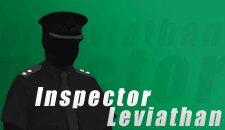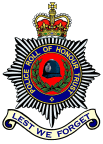I spent over an hour talking with this man, listening to how things were, and quickly realised that no matter what period in history an officer had patrolled the streets of Utopia, that we all share the same pride for having done so. I imagine it is the same elsewhere in the UK, if not the world. Unfortunately, I was called to return to the station to conduct a custody review, but I could have spent hours talking to this man. We said our farewells and I promised to drop in on him some time soon. Driving back to the station, the harshness and discipline he spoke about reminded me of the instructions I received from my Sergeant as a young probationary constable arriving at my first station in Oceana.
There were 10 points, and whichever one I transgressed during my probation, he would make me repeat to him verbatim:
1. You will run the tea club. You will do so enthusiastically. You will run it good. You will run it well. You may decide whether you want to collect subs on a weekly or monthly basis. The Inspector, other sergeants and I do not contribute to the running of the tea club, but you will ask us first above all others whether we would like tea, coffee, toast or biscuits after parade.
2. You will accept every shoplifter, sudden death and missing person report. If you are on foot patrol, which you will be until I am satisfied that you are capable of performing the role of operator in a marked vehicle, you will call up for a vehicle to collect you and take you to where you are needed.
3. You may come back to the station for your allocated refreshment breaks. You are not allowed in the station unless I or one of the other Sergeants requests your presence, or unless you have an arrest. I only want to see you on parade, in custody with a prisoner, on refreshments, or coming back to get changed out of your uniform at the end of the tour as I am going home.
4. You will not speak to the Inspector unless he asks you a question. If you want to speak to the Inspector, you will inform one of the other Sergeants or I of the subject you wish to speak to him about, and we will tell you not to bother him. Never transgress this rule.
5. You have no discretion. You will arrest anyone where an offence has been alleged against them, and you will give process tickets for every traffic offence that you observe. If you see the last hearse in a funeral cortege with the bereaved family not wearing a seat belt, you will give everyone of them a ticket. If the coffin is not suitably harnessed, you will give the bereaved a ticket.
6. Never ever complain about the conduct of a senior police constable. If you see something you do not like, learn from it, determine never to do it yourself.
7. If you are being bullied, do not bother the Inspector, other Sergeants or I. Resolve the matter physically, and hope that you are victorious.
8. Do not enter into a sexual relationship with a Woman Police Constable on your team. If you do, be prepared for the eventually that she will also be having a sexual relationship with one of your colleagues. I have seen this happen so many times, and I can assure you it will happen to you. There are far fewer WPC's in the force than there are men. She is in a Sweet Shop. She can have whatever different sweets she wants, and there will always be a nicer sweet than you.
9. I will only ever give you a direction once, or explain something once. If I have to tell you a second time, I will punish you. I will punish you severely. Do you understand? Or shall I repeat it?
10. I appreciate that you have a great deal of enthusiasm right now. Learn to temper it. I have been a police officer for 27 years. I love being a police officer. However, the force is now letting in people such as you. The force is not what it was. The job is f*cked. My Sergeant told me that when I joined and you will tell your new officers when, God forbid, you become a supervising officer.
'
The job's f*cked.' If I had a penny for every time I've heard that throughout my career, I'd have £5.42p.
"Sarge, my arrest from the other day had no further action taken by CID." "Don't worry, the officers in CID are there because they were useless on the street and never had a clue. The job's f*cked."
"Guv, I've had both my rest days cancelled this weekend." "I know, me too, my wife was very unhappy. I said to her, I said, "The job's f*cked," but she still made me sleep in the shed."
"Hey, you never guess what everyone, I'm receiving a Chief Constable's Commendation for getting that burglar sent down!" "Well, done, you worked hard on that job. It's very much deserved."
I know that as soon as the officer leaves the canteen someone will say, "Unbelievable. He's useless and lazy. The job's f*cked."
Thinking back to my conversation with that elderly gentleman, I realised how little the attitudes of police officers have changed throughout history. Particularly when, as I was getting into my car to leave, the veteran officer tapped me on the shoulder and said, "Just one more thing Inspector, is the job still f*cked?"


![Reblog this post [with Zemanta]](http://img.zemanta.com/reblog_e.png?x-id=5361ce2e-c3da-4b8e-802f-1933174e9f5f)

![Reblog this post [with Zemanta]](http://img.zemanta.com/reblog_e.png?x-id=0ab606ab-95d7-44ac-809e-dc3cf8c9d93c)



![Reblog this post [with Zemanta]](http://img.zemanta.com/reblog_e.png?x-id=14d0258b-e96b-4559-96dd-8a6382f1ab24)



![Reblog this post [with Zemanta]](http://img.zemanta.com/reblog_e.png?x-id=1426cd9d-d937-47eb-a5cb-fed9b61de8c8)

![Reblog this post [with Zemanta]](http://img.zemanta.com/reblog_e.png?x-id=94dbb54a-1e46-4471-9388-2b9bd41be65a)



![Reblog this post [with Zemanta]](http://img.zemanta.com/reblog_e.png?x-id=b01c5edd-8cbc-4a5c-8196-c1272bbc1c7e)



![Reblog this post [with Zemanta]](http://img.zemanta.com/reblog_e.png?x-id=cdc515a9-d4e9-4218-9cf0-71ce30ddeaa8)



![Reblog this post [with Zemanta]](http://img.zemanta.com/reblog_e.png?x-id=fad184c0-87e8-4f3d-9d88-a12651e71a55)



![Reblog this post [with Zemanta]](http://img.zemanta.com/reblog_e.png?x-id=56c64bc4-76e7-41c1-ad28-d245ebe666bc)

![Reblog this post [with Zemanta]](http://img.zemanta.com/reblog_e.png?x-id=d0f4c178-8e5d-4a1c-93d3-9401f24f5460)


![Reblog this post [with Zemanta]](http://img.zemanta.com/reblog_e.png?x-id=1b9ea01c-6724-4e0a-92f2-b7ec369af83c)


![Reblog this post [with Zemanta]](http://img.zemanta.com/reblog_e.png?x-id=cb562a71-4fbf-439d-9109-4351e2ad6ea9)


![Reblog this post [with Zemanta]](http://img.zemanta.com/reblog_e.png?x-id=b4b72f4f-0af5-47fd-968e-cdf0b1a76213)


![Reblog this post [with Zemanta]](http://img.zemanta.com/reblog_e.png?x-id=5ff65260-135a-47e2-9fc4-f4879296adcd)

![Reblog this post [with Zemanta]](http://img.zemanta.com/reblog_e.png?x-id=2172be33-e5c8-40ea-8934-63a96288c3a9)

![Reblog this post [with Zemanta]](http://img.zemanta.com/reblog_e.png?x-id=4870e592-0c3a-493a-849a-7a6ad09cce00)






